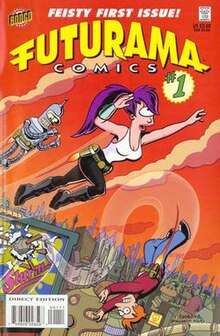Futurama Comics
| "Futurama Comics" | |
|---|---|

The front cover of issue #1
|
|
| Story | Multiple (based on characters created by Matt Groening) |
| Ink | Multiple |
| Pages | 25 |
| First publication | November 22, 2000 |
Futurama Comics is a comic book series published by Bongo Comics and based on the television series Futurama. It has been published bi-monthly in the United States since November 2000 (apart from a brief break for the crossover). It has been published in the United Kingdom (with an altered order) and Australia since 2002 and four trade paperbacks have been released. During the production hiatus between 2003 and 2006 and from 2013 to present it is the only new Futurama material being made. The comic book series continues its run, even after two cancellations of the TV series.
In the year 3000, the crew of the Planet Express delivery company make cargo shipments to unusual planets, as well as having adventures back on Earth. The main characters include Philip J. Fry, a slacker from the 20th century who was cryonically frozen for 1,000 years, cycloptic ship captain Leela, and an alcohol-fueled, troublemaking robot Bender. The comic will often make more use of supporting or minor characters than the series, such as Zapp Brannigan, Cubert Farnsworth, the Robot Devil and Inez Wong.
Each issue consists of at least one story of around 27 pages (occasionally brief stories also appear), and a letters and fanart page. There are also full-page mock advertisements marketing futuristic products (such as Brain Slugs), which parody the kinds of coupon offers found in other comic books.
Special editions of some issues are published on occasion; a variant of the first issue available only at Comic Con 2000 featured a golden background, rather than red.
In a similar vein to the parent series, each issue features a humorous caption on the cover (for example, "Made In The USA! (Printed in Canada)"). These captions also vary according to where it is sold. Coinciding with the change in format in issue 59, the caption was abandoned, along with the original logo. Each issue is a self-contained story which lasts one issue (though the Time Bender Trilogy spanned three issues) and it is printed in the standard 6⅝" x 10¼" size.
...
Wikipedia
